

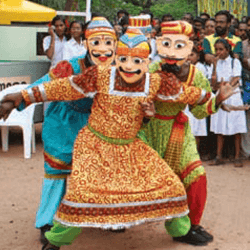
The street drama held as a part of the inauguration of the Sukrutha Keralam roadshow, at Govt. Girls High School, Cherthala, on November 15, 2006. The Malayala Manorama is not just Kerala's favourite daily. It is a part of the Malayali's life, guiding and rebuilding every step of the way. And the concern for others that the institution has been practising is not hemmed in by geographical boundaries.
Be it environment, education, the development of the state, building bonds or mending hearts, Malayala Manorama has been there and done that, sometimes acting as a catalyst and at other times striking out on its own
ENVIRONMENT
PALA THULLI (Many a Drop)
Ironically, Kerala lives up to the phrase, 'water, water everywhere but not a drop to drink'. While the state has 44 rivers, some 4.5 million wells, and receives 3,000mm of rainfall annually, it reels under severe water shortage. In response to a crying need, Manorama waged a war for water by launching the 'Pala Thulli' (Many a Drop) campaign in 2004 that focused on rainwater harvesting and the conservation of water. It was a watershed in the organisation's attempts to usher in water literacy in the state. The 'Pala Thulli' campaign was unleashed in phases. In the first phase, stress was on rainwater harvesting. A multi-media campaign was launched to create awareness on water conservation and to disseminate the technology behind rainwater harvesting. It was action-packed, featuring the construction of some 50 model rainwater harvesting units in different parts of the state, as well as educational articles in the newspaper, road shows, seminars, cultural programmes, photo exhibitions, TV programmes, brochures, and short films. Additionally, there were awards for schools, a 24-hour helpline, and a website. In the second phase (in 2005), the focus was on disseminating information about recharging wells, reviving ponds and other water bodies and on watershed development. In 2006 (the third phase), the quality of water became the talking point. Manorama collaborated with the Indian Institute of Science, Bangalore, to conduct a study of water samples from across the state. The study was an eye-opener to the widespread presence of E. coli bacteria in water. A report was submitted to the government. In the next leg of the campaign, which spanned several years, several activities were organised to involve the public in improving the quality of water. They included:
Jala Tharangam
(Water Warrior Programme): Joining hands with the Kerala State Water Resources Department, Manorama selected student volunteers from 1,000 schools and trained them to test the water quality in their neighbourhood. They were given free water testing kits. Their findings were submitted to the government. Experts from the department provided guidelines on how to purify drinking water. Awards were given to those school teams that conducted the tests best.
UNICEF steps in:The UN body partnered with Manorama in conducting campaigns to improve the quality of water across Kerala. Together, we conducted a 20-day road show in November 2010, covering the length and breadth of the state, from Thiruvananthapuram to Kasargod, with meetings and public awareness programmes on water quality.
Water-friendly awards: Cash awards were given to schools and colleges for excelling in water-friendly activities since 2004. In 2011, Manorama decided to recognise people's efforts in conserving water. Water-friendly practices from the three sectors of institutions, agriculture and domestic were selected for awards of Rs 1 lakh each. The feather in the cap came when Manorama's 'Pala Thulli' project was honoured with the UNESCO-IDPC award for rural communication. Malayala Manorama was also awarded the Indira Gandhi Paryavaran award and national water prize, corporate category, for its commitment to the causes of environment and water.
BHOOMIKKORU KUDA
(An Umbrella for the Earth) As an adjunct to the 'Pala Thulli' campaign, saplings were distributed to individuals, organisations, institutions and residents' associations free of cost on World Environment Day for three consecutive years from 2010. It was based on the expert view that trees effectively combat global warming. With the support of the Kerala Forest Department, Manorama distributed 3 million saplings in 63 taluks across Kerala. A random survey conducted showed that 67 per cent of the saplings were healthy and growing well. In 2010, the Limca Book of Records acknowledged the project as the biggest pro-environment activity in a single day by a media group.
Nature camps:
Children can be the best messengers of environmental protection. Not just that, they will be the ultimate beneficiaries of the green programmes initiated today. A competition was held for the children of families involved in the 'Bhoomikkoru Kuda' programme. Thousands of children who participated in the competition were asked to send in photos and stories on the trees their families were nurturing. Cash awards and certificates were distributed, and nature camps were conducted in six different places in the forests of Kerala. We organised a three-day Kerala Water Congress in 2015 in Thiruvananthapuram, where water conservators and activists such as Dr Rajendra Singh Viswanath and Dr Sunitha Narayanan were the chief guests.
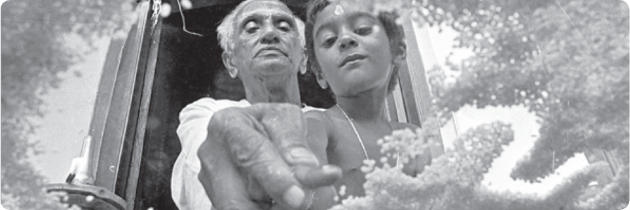
On Vijayadasami, in keeping with the religious significance of the day, Malayala Manorama holds Vidyarambham by initiating children into the world of letters. The function is held in all the Manorama offices across the country with literary and cultural icons taking on the role of the gurus. Apart from its special significance, the event has evolved into an annual cultural festival that everybody looks forward to.

A major highlight of this campaign was a unique stage show by celebrated Malayalam actor Mohanlal. He brought to life on stage select characters from the novels of 10 legendary Malayalam writers in an exquisite 50-minute show. The show lived up to its promise of showcasing the richness of Malayalam literature. It was staged in seven cities across India and in Dubai.
SUKRUTHA KERALAM (Clean Kerala)
Running alongside 'Pala Thulli' was the 'Sukrutha Keralam' mission focusing on waste disposal. This campaign was launched in 2006 in the backdrop of the chikungunya and dengue epidemics that invaded God's Own Country. It popularised inexpensive ways to reduce and dispose of waste. This was again a people-oriented programme on clean habits and a clean environment. Manorama exhorted people to keep public places and water bodies clean just like they would maintain their homes and surroundings. We reached out with booklets, CDs, training camps, road shows and photo exhibitions. The people were also exhorted to convert perishable waste into manure and use it for growing vegetables. Models of bio-gas plants, vermi-compost and pipe compost were popularised. The local bodies that excelled in keeping their area clean were honoured with awards. SAVE (Serve as A Volunteer for Energy) The Malayala Manorama collaborated with the Energy Management Centre of the Department of Power in 2008 to start a novel project for the conservation of energy. SAVE primarily targeted children, encouraging them to take steps to save energy in their homes. Those who made a difference to energy consumption were given prizes. Children between 10 and 17 years were covered under the programme. In fact, the Department of Power found that there was a substantial reduction in the domestic consumption of electricity, down by around 1.15 lakh units, during the period the contest ran. The then Power Minister declared that, during Manorama's campaign for energy conservation, there was a reduction in power consumption to the tune of 27 crore units. Manorama was honoured with an award for public service by the World Newspaper Association for this incredible feat.
ONLINE CAMPAIGN ON ENVIRONMENT
On World Environment Day in 2008, Manorama initiated an online campaign on the environment by launching an exclusive website www.manoramaonline.com/environment. The website carried environment-related news, success stories, photo and video galleries, documentaries and contact addresses of waste management agencies. Photo and documentary contests titled 'Greens' and Jeevajalam' were held in 2012.
VAZHIKKANNU (Eye on the Road)
In 2009, Manorama launched a campaign to raise awareness about the increasing number of road accidents in Kerala. The newspaper identified several road accidents from the police files and carried a series of feature articles to educate the readers on the precious lives lost due to negligent driving and the agony caused to the kith and kin of the victims. Workshops on how to reduce accidents were also conducted. Manorama took on the mission of educating children and elders on traffic rules and regulations. The schools that were proactive in this programme were rewarded.
EDUCATION YUVA MASTERMIND INNOVATION PROJECT
Initiated in 2010, this project intends to foster the innovative spirit among students. Every year, students from schools and colleges are invited to send in their innovative ideas. About 1,000 entries were received in the first year. After preliminary screening and interviews with the contestants, an expert panel selected 36 entries. Manorama gave financial assistance to the students to develop the shortlisted ideas. The programme's technical partner, Amal Jyothi College of Engineering in Kanjirappally, Kerala, played the role of the mentor. On completion, the projects were put on display, and a jury comprising eminent scientists selected three winners each from the school and college sections. Cash awards and citations were given away by former President Dr. A.P.J. Abdul Kalam in 2011 and N.R. Narayana Murthy, Chairman Emeritus of Infosys, in 2012. ENTE MALAYALAM [My Malayalam) Malayala Manorama has been at the forefront of promoting Malayalam through various activities, including reading workshops, promotional activities in schools, and, of course, through the hugely popular Ente Malayalam (My Malayalam) campaign. It brought eminent writers, thinkers, scholars and artists under one umbrella in its fight to save the mother tongue, increasingly threatened by English, which was being preferred by the new generation as the medium of communication. In fact, the campaign was not limited to rescuing the language. It also involved the preservation of Kerala's culture and tradition.

Malayala Manorama has its finger on the pulse of the people. There is a strong emotional connection between the newspaper and its readers. A fitting example was when the Iraqi forces invaded Kuwait in 1990. Following an emergency meeting in the newsroom to take stock of the situation, Manorama rushed a team of journalists to the Gulf. Their brief was not to report, but to comfort expats from the state whose lives were thrown into disarray overnight. Since Kuwait was under siege, the next best thing to do was to post the Manorama staff in Amman, the capital of Jordan. Amman served as the exit gateway for refugees seeking to return to their home countries. Malayalis included had an agonising time crossing the desert, many of them on foot, without food, adequate water or medicines. Once they entered Amman, the Manorama team took them over and made them comfortable.
The team even collected the names of all the Malayalis who had arrived safely and sent them across to Manorama offices in Kerala, and the list was promptly published in the newspaper the following day, to the relief of anxious relatives at home. In a rare gesture, Chief Editor K.M. Mathew wrote to each of the families, reassuring them of the safety of their breadwinners in the Gulf. The constantly updated list meant the Manorama staff burnt the midnight oil to pack the letters with the newspaper bundles to be delivered directly to homes. That, indeed, was journalism with a human touch.
REBUILDING HOUSES AND LIVES
When earthquakes flattened Latur in Maharashtra in 1993, and some parts of Gujarat on January 26, 2001, Malayala Manorama swung into action. Not only did we cover the two disasters exhaustively, but we were also there on the spot giving more than a helping hand. We did it out of a brotherly feeling: we had nothing to gain but goodwill, because we had practically no business interests in either state. Following the Latur quake, Manorama opened a relief fund with an appeal to its readers, which said: "Let us reach out and touch the frozen face of Latur." The public response was spontaneous with donations pouring into the relief fund, which resulted in a collection of around ₹25 million. Manorama was allotted the task of rebuilding the Banegaon village by the Maharashtra government. Architects commissioned by the organisation spent a month amid the debris and drew up plans for rebuilding the village. A workforce was hired to execute it. In 15 months, an entire village took shape with 163 houses, roads, a library, a hospital, a panchayat office, an open-air theatre, a village parlour, a gymnasium, a tank to collect rain water and even a Hanuman temple. It was a holisitic village in every sense of the term.
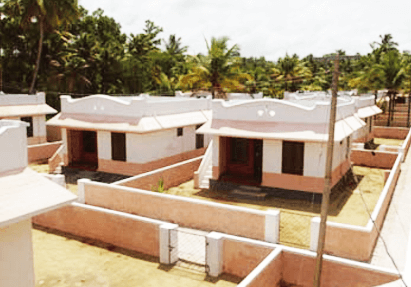
Manorama constructed 145 houses for tsunami survivors in three coastal villages in Kollam and Alappuzha districts. In December 2004, when the tsunami hit Kerala's coastline and made many homeless, Manorama constructed 145 houses in three coastal villages of Kollam and Alappuzha districts with contributions from our readers. The labour of love was called 'Snehatheeram', meaning the shores of love.
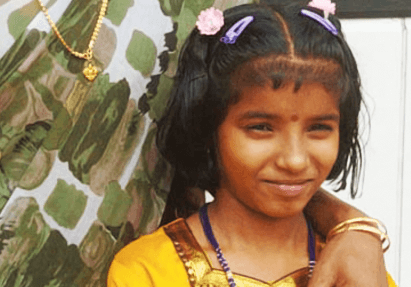
In the course of a random survey of cardiac cases in Kerala in 1999, Manorama found that many patients were resigned to their fate, lacking the resources for critical heart surgery. Most revealing was the plight of children with congenital heart defects battling for their lives. Joining hands with the Madras Medical Mission Hospital in Chennai, the newspaper launched a project for free heart surgery, aptly calling it Hridayapoorvam, meaning 'heartfelt'.
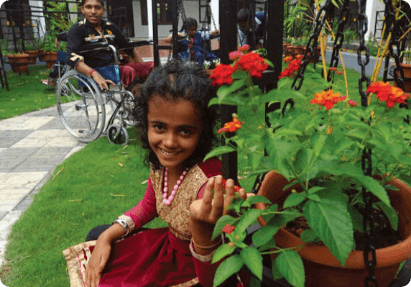
Opening doors of compassion for children with neuro disabilities. The inspiration for this campaign was an eye-opening statistic in the 2015 Census undertaken by the state, which has 1,00,000 children who suffered from neuro disabilities. We did an investigative series on human rights violations against children with disabilities like autism, cerebral palsy, intellectual disability, multiple disabilities, and followed it up with a sensitisation campaign aimed at building social support for them.